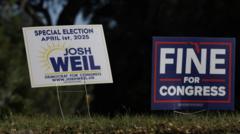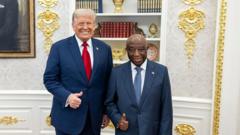In the contest for a congressional seat formerly held by a Trump ally, both parties are viewing it as a crucial indicator of future electoral dynamics.
### Florida Special Election Signals Political Tensions Ahead of Mid-Terms

### Florida Special Election Signals Political Tensions Ahead of Mid-Terms
As mid-term elections approach, Florida's special ballot reflects voter sentiments amidst a polarized political landscape.
Standing in a strip-mall parking lot in Ocala, Florida, Democratic congressional candidate Josh Weil rallied a small crowd of supporters with optimism about flipping a historically Republican seat, potentially altering the balance of power in the House of Representatives. "Their 2025 agenda stops here," Weil declared, criticizing President Donald Trump and Elon Musk's proposals to cut government services.
Conversely, Randy Fine, Weil's Republican opponent, cautioned voters during a telephone town hall, framing the Democratic push as a significant threat to Trump's agenda. "Democrats are mad," he claimed, indicating a heightened motivation among voters driven by the recent political climate.
This special election, motivated by the need to fill the seat vacated by Michael Waltz—who recently faced a scandal—has drawn national attention. Although Trump won this district by over 30 percentage points in the last election, Weil has raised an impressive $10 million for his campaign, a stark contrast to Fine’s $1 million fundraising.
An internal poll suggests a competitive race, with Weil even leading in some Republican surveys, stirring anxiety among GOP supporters. "There's no excuse for a Republican not to win this race," warned Republican activist Randy Ross, suggesting that voter turnout would be pivotal.
Key figures from the Republican party, including Trump, have mobilized in support of Fine in a bid to maintain their stronghold. Fine received a financial boost from Musk's political committee and other conservative groups. With special elections typically experiencing lower voter engagement, Republican leaders emphasize the necessity of energizing their base.
The House dynamics intensify the importance of this election, as Republicans hold a fragile 218 to 213 majority, leaving no room for losing supposedly secure districts. A possible Democratic victory would not only alarm Republicans but could also shift perceptions ahead of the upcoming mid-terms.
As both parties strive to interpret the election’s wider implications, Republicans attempt to downplay its significance, while Democrats rally around Weil's challenge. "These races should not be on anyone’s political radar," stated Democratic House Minority Leader Hakeem Jeffries, highlighting Democratic discontent with the current Republican agenda.
Supporters of Weil expressed that even a close loss could signal moderate Republicans' need to reassess their allegiance to Trump's leadership. The intense contest echoes past special elections that foreshadowed larger political movements, with both parties acutely aware that the repercussions of this race could resonate through the 2024 elections and beyond.
As Florida’s voting day unfolds, the stakes are perceived as a critical litmus test for both parties, signaling deeper ideological divides and potential future shifts in political power.
Conversely, Randy Fine, Weil's Republican opponent, cautioned voters during a telephone town hall, framing the Democratic push as a significant threat to Trump's agenda. "Democrats are mad," he claimed, indicating a heightened motivation among voters driven by the recent political climate.
This special election, motivated by the need to fill the seat vacated by Michael Waltz—who recently faced a scandal—has drawn national attention. Although Trump won this district by over 30 percentage points in the last election, Weil has raised an impressive $10 million for his campaign, a stark contrast to Fine’s $1 million fundraising.
An internal poll suggests a competitive race, with Weil even leading in some Republican surveys, stirring anxiety among GOP supporters. "There's no excuse for a Republican not to win this race," warned Republican activist Randy Ross, suggesting that voter turnout would be pivotal.
Key figures from the Republican party, including Trump, have mobilized in support of Fine in a bid to maintain their stronghold. Fine received a financial boost from Musk's political committee and other conservative groups. With special elections typically experiencing lower voter engagement, Republican leaders emphasize the necessity of energizing their base.
The House dynamics intensify the importance of this election, as Republicans hold a fragile 218 to 213 majority, leaving no room for losing supposedly secure districts. A possible Democratic victory would not only alarm Republicans but could also shift perceptions ahead of the upcoming mid-terms.
As both parties strive to interpret the election’s wider implications, Republicans attempt to downplay its significance, while Democrats rally around Weil's challenge. "These races should not be on anyone’s political radar," stated Democratic House Minority Leader Hakeem Jeffries, highlighting Democratic discontent with the current Republican agenda.
Supporters of Weil expressed that even a close loss could signal moderate Republicans' need to reassess their allegiance to Trump's leadership. The intense contest echoes past special elections that foreshadowed larger political movements, with both parties acutely aware that the repercussions of this race could resonate through the 2024 elections and beyond.
As Florida’s voting day unfolds, the stakes are perceived as a critical litmus test for both parties, signaling deeper ideological divides and potential future shifts in political power.




















